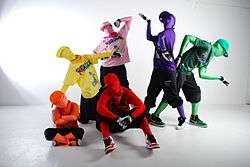Morphsuits
Morphsuits is a company in Edinburgh, Scotland.[3] It distributes branded spandex costumes, based on the existing skin-tight garments, which cover the entire body. The company offers over 80 different designs. The company was founded by brothers Ali and Fraser Smeaton, and their flatmate Gregor Lawson.[2] After a year of running the company, the trio left their jobs at Barclays, Procter & Gamble, and BT Group.[3]
| Private | |
| Industry | Fancy dress/costume |
| Founded | 2009[1] |
| Founder | Ali Smeaton, Fraser Smeaton, Gregor Lawson |
| Headquarters | Edinburgh, Scotland , United Kingdom |
Key people | Smeaton, Smeaton, Lawson |
| Products | Morphsuits, Morphsuits Kids |
| Revenue | £4.5m[2] |
| Owner | Smeaton, Smeaton, Lawson |
Number of employees | 22 direct |
| Website | www |
Expansion plans include children's sizes,[2][4] recently introduced as MorphKids, and female-targeted accessories.[2]
Morphsuits is a division of AFG Media, which includes menswear line Foul Fashion and golf wear line Royal & Awesome.[5][6] They are working on a womenswear line.[7]
History

According to the founders' account, they were inspired to create the company after either a stag weekend[3] or a one-color costume party in Dublin, to which a friend of the founders was wearing a zentai bodysuit. At the event, the friend became somewhat of a celebrity, being bought drinks and posing for hundreds of pictures.[4] After researching the fancy dress market, Smeaton, Smeaton, and Lawson invested £1,000 each,[6] redesigning the suit for better vision.,[3] The original corporate website cost $300.[4] A variety of materials, thicknesses of materials, and stitchings were tried.[8] According to Fraser Smeaton, they conceived "Morphsuit" as the name for their product because they believed "everyone who wore them morphed into a more fun version of themselves".[3]
Beginning in May 2009,[6] shipping of the first batch of 200 costumes was done from their flat.[4][6] Balancing their day jobs and the company meant "a lot of 2 a.m. finishes" while running their business. As of August 2011, outsourcing had raised their indirect staffing to 200.[4] As of late 2012, suits were manufactured in Shanghai.[6]
The company received a boost to its sales when the 2009 British Lions tour of South Africa, at which eight fans wore red Morphsuits, was covered extensively by sports journalists and photographers.[9]
Many early mainstream appearances of similar suits in North America were not their brand: The Green Men, two fans of the Vancouver Canucks NHL team, used Super Fan Suits,[10] as do hip-hop group The Body Poets,[11][12] while appearances on It's Always Sunny in Philadelphia[13] predate either brand's founding.
As of August 2011, there were 40 varieties,[4] and 50 as of September 2011.[9] MorphKids, a children's sized line, was launched in the United States before any other market. The company sold 35,000 units in 48 hours.[14] Around Halloween 2012, a psychologist noted increased confidence and social skills in children wearing the outfits, and an "overall calming effect" in children with autism.[15] As of April 2013, stated it expected MorphKids to outstrip the parent brand four-fold.[5] In October 2012, Morphsuits launched their first licensed design, featuring Saban's Mighty Morphin' Power Rangers;[16] the company claims the costumes were the "best selling item" in their history.[17] With their investment from BFG, they hoped to pursue the Spider-Man license, deeming licenses "fundamental to the business's future success."[6] In 2013 Morphsuits added "Animal Planet" Morphsuits, including a Vampire Bat with fabric wings connected to the arms, and a Cobra with a neck frill. Other products include the head-only lycra Morphmask and Megamorph, an inflated suit with lycra over the head, hands, and feet.[6]

Corporate
As of May 2011, it claimed to be the world's largest fancy dress brand.[18]
As of 2011, Gregor Lawson had worked in brand management for eight years. Trained with "FMCG marketing" (fast-moving consumer goods) at Gillette and later Procter & Gamble, he led marketing on Pantene, Pringles, and Gillette. He left P&G in July 2010.[18] Lawson is brother of rugby union player Rory Lawson, son of rugby union player Alan Lawson, and grandson of rugby union commentator Bill McLaren.[9]
In their first year, the company sold 20,000 costumes, bringing in £1.2 million.[2] Between January and October 2010, the company shipped 10,000 units to Canada.[19] As of Halloween 2010, they expected £6 million of business in the second year.[3] In the 2010–2011 financial year, they did £4.5m in sales.[2] They expect £10.5m in revenue in the 2011–2012 fiscal year.[2] In October 2010, Morphsuits gave 2011 estimates of £6 million; by July 2011, they told the BBC of a year end estimate of £10 million.[2] The company sold an initial order of 100,000 Morphsuits to retail chain Party City.[2][9] The company expect sales of £309,980 in October 2012.[20]
| Fiscal year | Units sold | Revenue |
|---|---|---|
| 2009–10 | 50,000[2] | £1.2m[2] |
| 2010–11 | 250,000[2] | £4.5m[2] or £4.2m[21] |
As of 2011, the partners had no direct employees, all jobs are outsourced. As of summer 2011, that included a Chinese manufacturer, warehouses in the United States, United Kingdom, and Australia, and a customer contact centre in Fife.[2] As of October 2010, Fraser looks after the business' commercial side, Gregor runs marketing, while Ali runs finance and logistics.[8] In 2012, Mishal Verjee was added as Marketing Director.[16] One September 2012 article cited AFG in employing 21 staff at five sites worldwide, but did not clarify if they were direct or outsourced.[6]
The founding entrepreneurs have spoken publicly about their dislike for UK tax rules, which make "company owners pay 40 per cent on any sum taken out in dividends above £35,000, against only 10 per cent if they were to sell their business." They have suggested incentives to expand operations would be more beneficial than "inducements" to sell their company.[9] The company received overtures from private equity investors in 2011, since their Ernst & Young Entrepreneur of the Year Awards nomination in Scotland, that year; they have suggested the business has kept them too busy to consider any of the offers.[9]
In February 2012, the company (as AFG Media) received a £600,000 loan from Barclays Corporate.[22]
In July 2012, Business Growth Fund invested £4.2 million in AFG,[5] the size of its stake was unannounced, but their firm generally takes between 10% and 40% of the share capital.[23] The investment was meant to help product development, the MorphKids line, and develop supply chain as the company looks to expand in the US, Europe, Mexico, Russia, Japan and China.[5][23] Ralph Kugler was introduced as chairman of the company's board,[5][23] and Duncan Macrae also added to the board.[23]
They have a low rate of product return, at just 1%, which they credit to the limited SKU (stock-keeping unit), allowing them to ensure consistent quality of the product.[4]
Marketing

The company's Facebook page has been a key element in their marketing, with 250,000 fans as of Halloween 2010,[3] 760,000 fans as of September 2011.[9] The page reached one million likes on April 15, 2012. The company uses the page to run photo sharing, competitions, events, and "flash morph meetings". One competition included a design competition for Halloween suits.[3] Gregor Lawson has spoken at seminars about technology and business, about their use of Facebook and e-commerce.[21] Much of their marketing strategy is based on fans' ideas, a process Fraser Smeaton calls "scrum marketing"; suit designs, potential sales outlets, and competitions have all been dictated by its followers.[1]
There are regional sales differences: in the United Kingdom, the product is considered year-round, with a small jump in sales near Halloween. In the United States, sales are much more highly focused at the Halloween season.[4] The company runs 13 localized e-commerce websites.[21]
Black is the company's most popular colour.[4] The majority of Morphsuits' customers are men, but the company hopes that a new morphsuit model with a built-on tutu will expand female sales.[4]
The brand has tried to distance itself from the term zentai, and the concept of fetish usage.[19] Being one of the earliest brands to court a general market, the terms "Morphsuits" and "morphs" are regularly applied to events related to any sort of zentai suit. Their term risks becoming a genericized trademark in the process; one New Zealand newspaper refers to competing brand, Jaskins, as a "one of the main online morphsuit brands."[13] Says Gregor: "We now offer 23 different Lycra suits and we have lots of copycat competitors, but because we bought the name Morphsuits no one can trade under that name but us."[3]
For a while, the website's FAQ page listed the suits as legal globally. This response either ignored or overlooked Anti-mask laws, such as those in France.
References
- "The Joy of 'Dex: Interview with Morphsuits". NMK. London: University of Westminister. 13 December 2011. Archived from the original on January 9, 2012. Retrieved 19 December 2011.
- "Edinburgh firm Morphsuits stretches global reach". BBC.co.uk. London UK. 23 July 2011. Retrieved 28 September 2011.
- Loveless, Helen (31 October 2010). "Friends morph into potential tycoons". Financial Mail Women's Forum. Kensington, London, UK. Archived from the original on 17 November 2011. Retrieved 29 September 2011.
- Heugel, Abby (23 August 2011). "Morphsuit Mania". Party and Paper. Sparta MI. Retrieved 29 September 2011.
- Brown, Tim (28 April 2013). "Business Growth Fund invests £4.2m in fancy dress Morphsuits". The Manufacturer. London. Retrieved 7 May 2013.
- Williams, Hattie (16 September 2012). "How I Made It: Greg Lawson and Fraser Smeaton of AFG Media". The Sunday Times. London. Archived from the original on 16 September 2012. Retrieved 8 May 2013.
- Dorsey, Kristy (19 March 2012). "Interview: Gregor Lawson, Fraser Smeaton and Ali Smeaton; creators of Morphsuits". The Scotsman. Edinburgh. Retrieved 3 November 2012.
- Morphsuits interview, YouTube
- Kristy Dorsey; Terry Murden (18 September 2011). "Morphsuits trio urge tax changes to help growth". Scotland on Sunday. Edinburgh UK.
- Jory, Derek (January 11, 2010). "Force & Sully". Vancouver Canucks and the National Hockey League. Retrieved May 25, 2010.
- Dluzen, Robin (25 July 2011). "SuperFanSuits.com: The Lucrative Business of Full Body Spandex". TINC Magazine. Chicago IL. Retrieved 25 July 2011.
- Kristen Perez, editor (10 October 2010). The Body Poets- Demo Reel 2010 (streaming video). Event occurs at 2:15. Retrieved 15 July 2011.
- "Second skin, secret life". Taranaki Daily News. New Plymouth NZ. 21 September 2010. Retrieved 15 July 2011.
- Roberts, Katie (11 May 2012). "Morphsuits launches kids range". ToyNews Online. Hertford UK. Archived from the original on 2012-05-14. Retrieved 11 May 2012.
- Hudson, Catherine (22 October 2012). "Trendspotting: Morphsuits". Made for Mums. London. Retrieved 3 November 2012.
- Sacco, Dominic (15 October 2012). "Morphsuits launches Power Rangers costumes". ToyNews. Hertford, Hertfordshire, UK. Archived from the original on 17 October 2012. Retrieved 3 November 2012.
- "Power Ranger Morphsuits mark shows 20th anniversary". ATV Today. 12 October 2012. Retrieved 3 November 2012.
- "Meet the Scholars 2011" (PDF). The Marketing Academy. 11 May 2011. Retrieved 29 September 2011.
- Bascaramurty, Dakshana (28 October 2010). "Zentai suits – not just fetish wear any more". The Globe and Mail. Toronto ON. Retrieved 28 September 2011.
- Thomas, Charlie (25 October 2012). "Halloween Helps Bring Retail And Events Back From The Undead". Huffpost Business United Kingdom. Retrieved 3 November 2012.
- Terra Incognita Programme, Harper McLeod LLP, 5 October 2011
- "Loan to help 'morphsuit' maker meet demand". BBC News. 20 February 2012.
- "BGF sees promise in Morphsuits firm AFG Media". Growth Business. London. 2 July 2012. Retrieved 8 May 2013.
- https://www.youtube.com/watch?v=e_WhMcppV5E